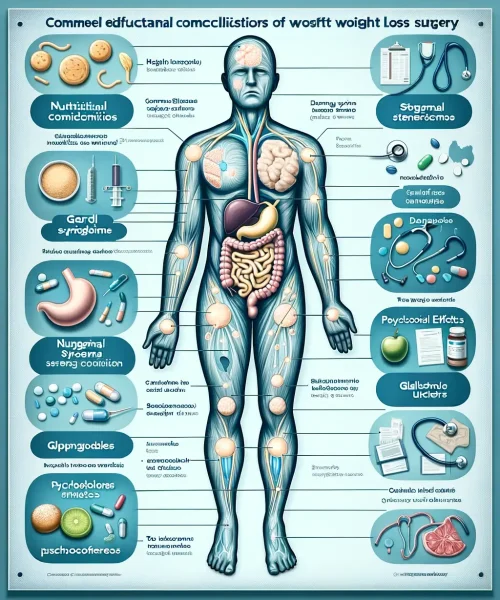1. Acid Reflux or GERD
After a gastric sleeve procedure, some patients may experience new or worsening symptoms of gastroesophageal reflux disease (GERD). This condition occurs when the lower esophageal sphincter weakens or relaxes inappropriately, allowing the stomach’s contents to flow back into the esophagus. Symptoms can include heartburn, chest pain, and difficulty swallowing. Managing GERD post-surgery typically involves dietary modifications, medications, and in some severe cases, additional surgical interventions.
2. Nutritional Deficiencies
The significant reduction in stomach size after a gastric sleeve surgery impacts not only the quantity of food intake but also the body’s ability to absorb essential nutrients. Common deficiencies observed post-surgery include iron, calcium, vitamin B12, and vitamin D. These deficiencies can lead to serious health issues such as anemia, osteoporosis, and neurological problems. To prevent these complications, lifelong supplementation and regular nutritional monitoring are essential.
3. Stomach Stretching
Stomach stretching is a concern for gastric sleeve patients when the reduced stomach begins to expand over time due to consistent overeating. This can diminish the effectiveness of the initial surgery, leading to less satisfactory weight loss results or weight regain. Patients are advised to adhere strictly to their recommended dietary guidelines to avoid stretching their smaller stomachs.
4. Weight Regain
Despite the initial effectiveness of gastric sleeve surgery in promoting significant weight loss, there is a risk of weight regain if lifestyle modifications are not maintained. Factors contributing to weight regain may include poor diet, lack of exercise, and not following post-operative dietary recommendations. Continuous lifestyle counseling and support groups are beneficial for maintaining weight loss goals.
5. Surgical Complications
As with any major surgery, gastric sleeve surgery carries risks of complications such as infection, bleeding, and adverse reactions to anesthesia. A specific risk associated with this surgery is the possibility of a leakage from the staple line used to reduce the stomach size. Such complications require immediate medical attention and can significantly affect patient recovery.
6. Nausea and Vomiting
It is common for patients to experience nausea and vomiting after gastric sleeve surgery, particularly as the body adjusts to a drastically smaller stomach and changes in food intake. Dietary adjustments, such as eating smaller, more frequent meals and avoiding trigger foods, can help manage these symptoms.
7. Physical Discomfort
Post-operative pain and discomfort in the abdominal area are typical following gastric sleeve surgery. This discomfort usually diminishes over time but can be significant in the days immediately following the procedure. Pain management strategies, including medications, are essential for a comfortable recovery process.
8. Psychological Effects
The significant and rapid weight loss after gastric sleeve surgery can lead to profound psychological effects, including mood swings, depression, or even eating disorders. Patients may struggle with the emotional aspects of adjusting to their new body image and lifestyle. Psychological support through counseling or support groups is crucial for navigating these changes.
9. Constipation
Changes in diet and reduced food intake after surgery can lead to constipation. This can be uncomfortable and may require dietary adjustments to increase fiber intake, as well as the use of laxatives or other medications to promote bowel regularity.
10. Stomal Stenosis
Stomal stenosis is a potential complication where the opening between the stomach and the small intestine narrows, leading to obstructed food passage. Symptoms include vomiting and abdominal pain after eating. Treatment typically involves procedures to stretch the opening and allow food to pass more freely.
This expanded coverage of each issue provides a thorough examination of potential complications and considerations for those thinking about or having undergone gastric sleeve surgery.

Complications Of Weight Loss Surgery
Weight loss surgery, or bariatric surgery, includes various procedures such as gastric sleeve, gastric bypass, and adjustable gastric banding. Each type has its specific risks and potential complications. Here are some general complications that can occur with weight loss surgeries:
1. Nutritional Deficiencies
Due to reduced food intake and changes in the digestive system, deficiencies in vitamins and minerals such as iron, vitamin B12, calcium, and vitamin D are common. These deficiencies can lead to conditions like anemia, osteoporosis, and neurological changes.
2. Surgical Complications
These can include:
- Infections: Risk of infections at the site of surgery.
- Bleeding: Can occur during or after surgery.
- Anastomotic leakage: Leakage from the surgical connection between the stomach and intestines.
- Bowel obstruction: Scar tissue or hernias can cause blockages in the intestines.
3. Dumping Syndrome
Especially common after gastric bypass surgery, this syndrome occurs when food moves too quickly from the stomach to the small intestine. Symptoms include nausea, vomiting, diarrhea, dizziness, and sweating.
4. Gastroesophageal Reflux Disease (GERD)
Increased acid reflux can occur, particularly after a gastric sleeve surgery, leading to discomfort and potential esophageal damage.
5. Hypoglycemia
Some individuals may experience low blood sugar levels if their new smaller stomach empties too quickly, particularly after consuming sugars.
6. Stomal Stenosis
This involves the narrowing of the opening between the stomach and intestine or at the site of a stomach stapling, leading to obstructed food passage.
| Complication | Description |
|---|---|
| Nutritional Deficiencies | Deficiencies in vitamins and minerals due to reduced intake and absorption. |
| Surgical Complications | Includes infections, bleeding, and anastomotic leakage. |
| Dumping Syndrome | Rapid gastric emptying causing nausea, diarrhea, and dizziness. |
| GERD | Increased gastroesophageal reflux disease symptoms after surgery. |
| Hypoglycemia | Low blood sugar levels, especially after eating sweets. |
| Stomal Stenosis | Narrowing of the new stomach outlet or connection causing obstructions. |
| Weight Regain | Potential weight gain back if lifestyle changes are not maintained. |
| Psychosocial Effects | Mental health issues such as depression and anxiety post-surgery. |
| Gallstones | Formation of gallstones due to rapid weight loss. |
| Ulcers | Development of peptic ulcers at the site of the surgery. |


